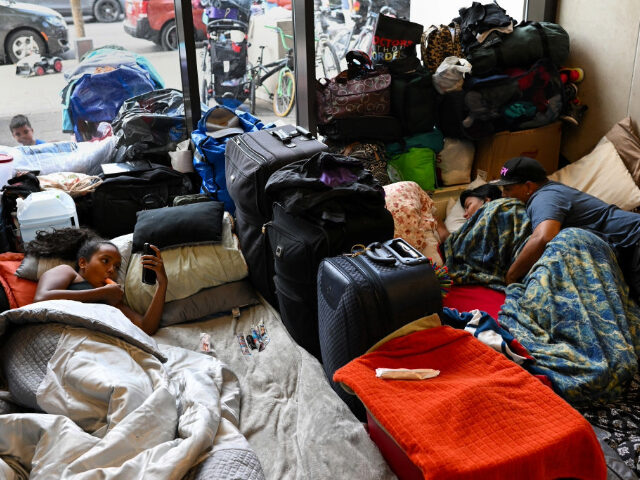Chicago has reportedly taken meetings with illegal alien advocates from St. Louis, Missouri, about a deal to ship thousands of border crossers from the Windy City to the Gateway City.
St. Louis Mayor Tishaura Jones (D) recently launched the city’s “Office of New Americans” with an eye toward helping illegals settle in the city on the Mississippi River, and now several advocacy groups in St. Louis are nudging Chicago officials to open up the spigot, according to the Chicago Sun-Times.
The nonprofit International Institute of St. Louis is one organization asking Chicago’s city hall to consider shipping illegals south to Missouri.
“It could be the potential for a great relationship between both cities,” Karlos Ramirez, vice president of Latino outreach for the International Institute, told the Sun-Times. “If the [migrants] are going to be in a better place, St. Louis is going to be in a better place, and Chicago is going to be in a better place. I think everybody wins.”
Ramirez added that unions and private funding could foot the bill to house illegals, provide them with cell phones, and help them find work in the St. Louis area.
Chicago officials have not commented on the plans, but the Windy City is in a crisis after more than 18,0000 illegals have flooded the city.
WATCH: Immigrants Make Camp, Scatter Belongings and Trash in Police Stations Around Chicago
Video Source: Rebecca Brannon, Independent Photojournalist/LOCAL NEWS X /TMXThe St. Louis activist told the Sun-Times that he has already taken meetings with Beatriz Ponce De León, Chicago Mayor Brandon Johnson’s (D) deputy mayor of immigrant, migrant and refugee rights.
Other activists in St. Louis also love the idea. Jerry Schlichter, an attorney who has helped settle Afghans and Bosnians in St. Louis, insists that the city is in need of workers:
There’s a tremendous need for employees. If you look around the country at cities that are growing, it’s primarily from immigrants and children of immigrants. That’s what we’re trying to build here — to increase our population, make a more vibrant St. Louis and a more diverse St. Louis, which is a benefit for everyone.
Schlichter may have a point. Like many deep blue, big U.S. cities, St. Louis has been steadily losing its population as residents flee soaring taxes, worse crime rates, and job loss.
The Census Bureau has reported that the St. Louis region of Missouri lost more than 11,000 citizens — or 0.4 percent — between 2021 and 2022, according to KSDK-TV. And it was worse from 2020 to 2021, when 0.23 percent fled the region.
The city itself and the county it occupies, though, have suffered an even greater statistical loss. The county lost 0.78 percent from 2021 to 2022 and saw a more than 0.48 percent loss between 2020 and 2021.
Still, Ramirez is careful to note that he does not just want any illegal migrant. He says that his organization would prefer a particular segment of the illegals in Chicago. He wants only those migrants who “started their asylum claims in their home countries under a specific Biden administration program,” CBS Channel 2 noted.
“I understand that there probably will be some people that will come on their own, and we’ll have to deal with those people as well, but we are trying to be strategic and intentional,” Ramirez exclaimed.
“We don’t want to make false promises that we can do something more than Chicago or New York have done for the people who cannot work, but for the people who have a work permit, we are offering them the opportunity to build their lives here,” Schlichter added.
Ramirez says he wants to start small with 12 illegals, but Schlichter said he is looking for more like 500.
Officials in St. Louis have also cautioned that no plans have been set in motion. Nick Dunne, a spokesperson for the city of St. Louis, added that there have been no “direct communications” with Chicago officials, according to KSDK-TV.
It is likely that officials in the Gateway City are fearful of opening the floodgates and that they will suffer a similar fate as cities in New York, California, Massachusetts, Colorado, and Illinois, where resources were quickly overwhelmed with tens of thousands of illegals seeking free shelter, food, clothing, and healthcare.
NOTE: This article has been corrected to reflect St. Louis’s location on the Mississippi River, not the Ohio River.
Follow Warner Todd Huston on Facebook at: facebook.com/Warner.Todd.Huston, or Truth Social @WarnerToddHuston

COMMENTS
Please let us know if you're having issues with commenting.